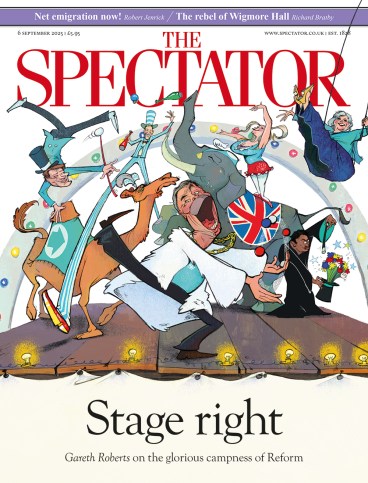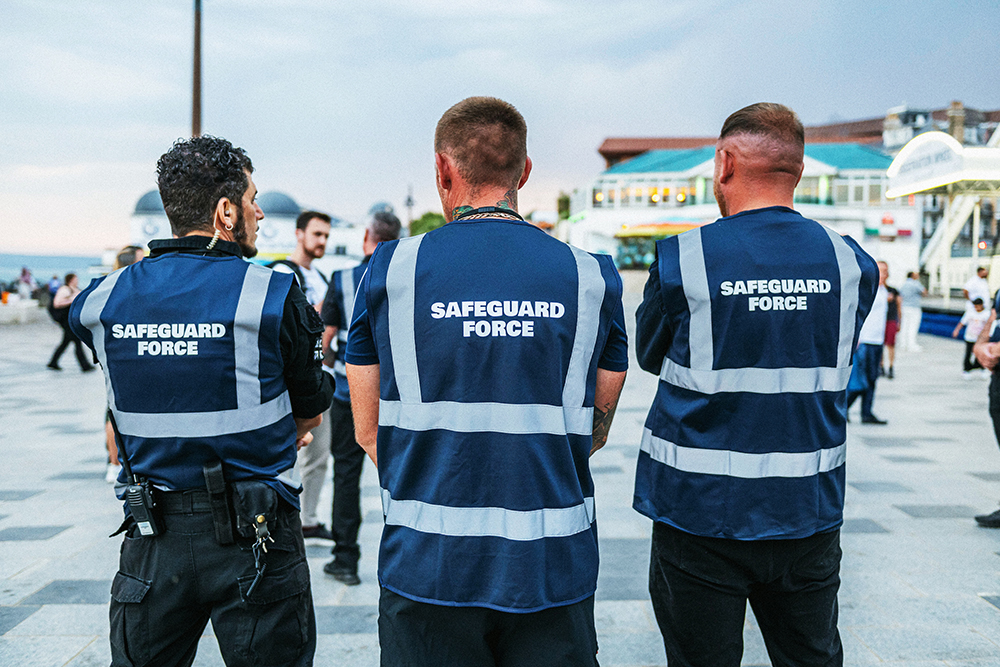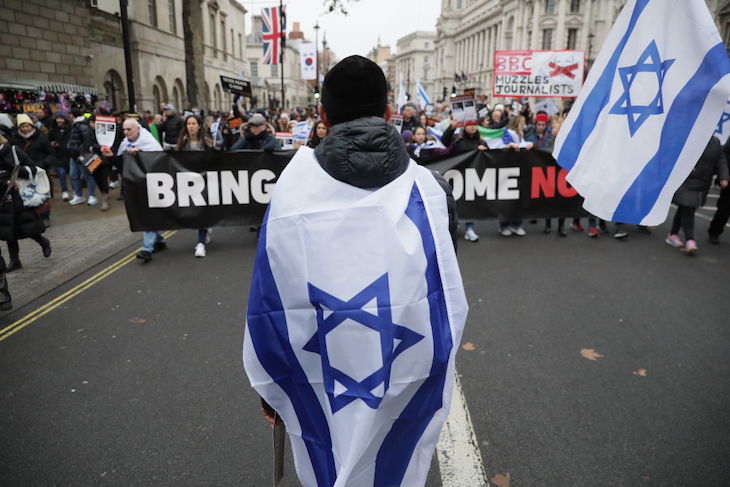
Chris Hargreaves used to be a wellness coach with a promising future in reality television. In 2023, he starred in E4’s Big Celebrity Detox and tried to cleanse Kerry Katona’s soul with piñón blanco seeds. Today, he leads The Shield: a private volunteer police force of hundreds of officers. They plan to begin patrolling Britain’s streets imminently.
Hargreaves and his team regard Britain as a place of increasing lawlessness. Many would agree. Shoplifting is at record highs, prosecutions are near record lows and people are asking where the authorities have gone. According to a poll by Merlin Strategy for The Spectator, only around half of British people have spoken to a police officer in the past 12 months. Neighbourhood policing is dead, and in its absence new forces are emerging.
The Shield is promising to take on much of the work that neighbourhood PCs have historically done. Hargreaves says they will monitor high-crime precincts, gather local intelligence and build relationships in the community. When they make an arrest, the real police will be called to deal with the suspect. ‘It’s going to be like Neighbourhood Watch on acid,’ says one overexcited Shield officer.
The group is not unique. In Bournemouth, another volunteer policing group called Safeguard Force recently launched. It too has nationwide ambitions. Ritchie Wellman, Safeguard Force’s founder and a former bouncer, instructed his officers to reassure the public on their inaugural patrol that ‘this is not a takeover’. His volunteers were given hi-vis jackets and positioned along the seafront, in the town centre and in ‘the gardens’ (a particularly dodgy part of town behind the beach). They were instructed that they were principally there to deter crime – after all, they looked pretty official – and were also reminded that they have no special legal authority. Like all private police, and you or I, they could perform a citizen’s arrest if they caught someone committing a crime, but that’s all they could do, lawfully.
I was in Bournemouth that evening, and watched everything pass quite calmly. People asked one team of officers for directions to a coffee shop. Another broke up a fight without any trouble. I assume they were accepted so readily because the real police had been so invisible. Surveys show victims’ satisfaction with the police has dropped 20 percentage points in a decade, and in The Spectator’s poll, 51 per cent of people said they would consider joining a neighbourhood patrol if one were established in their area.
‘It’s going to be like Neighbourhood Watch on acid,’ says one over-
excited Shield officer
In the near future, it would be unsurprising if in some towns the responsibility for keeping order is divided between the police and another, unofficial, power. In London’s West End, this is basically already the case. Some of the district has been all but abandoned by police, leaving a group called My Local Bobby (MLB) in charge.
MLB was started nine years ago by David McKelvey, a retired Metropolitan Police officer with 28 years’ service. He noticed earlier than most that there were fewer ‘bobbies on the beat’ and suspected that this was encouraging crime. McKelvey recruited dozens of staff, trained them up and began renting them out for a fee to residential and commercial clients across the south-east. In 2021, businesses in the West End asked him to sort out the area. It has become his most demanding operation. McKelvey invited me to follow the team for a night.
It was a Thursday at 11 p.m. and all the wrong ’uns were out. Drunks in gilets, pimps in leather jackets and thieves wearing masks on streets I’ve been asked not to name (MLB’s clients don’t want me scaring people away). Within 20 minutes, the four MLB officers had found a man carrying a large, foil-lined Chanel bag. It was early, so the bag was empty, but the man was obviously a shoplifter. Goods with magnetic tags won’t set off shop alarms if they’re placed inside a foil-lined bag.
The MLB officers told the man to clear off. He accepted their authority, despite them having no more legal powers than a normal member of the public. ‘This place is a black hole,’ said one of the officers. ‘It sucks in all the light.’
In pairs, we did the usual rounds. We visited a dark corner of a car park where a transgender prostitute takes clients. Bushes where knives are often stashed. The team prevented a drunk from getting mugged – ‘I was just helping him!’ cried the criminal – and later the guys pointed to a bit of pavement where they recently stopped a sexual assault. Three hours went by before we saw any actual police.
At 4 a.m., the MLB team caught a 13-year-old phone thief, put him in handcuffs and detained him. The police then came and took him away. This month, two of the MLB officers I was with are receiving commendations from the Met for being the first on the scene of a stabbing last year.


MLB is able to do all this only because its officers are here every day. The same guys walk the same beat, 11 p.m. till 7 a.m. They know the frequent offenders by name and they know their tactics. Phone thieves, the officers say, like to befriend vulnerable drunks and ask them to pull up their Instagram on their phones. While their device is out, an accomplice flies in and snatches it. The officers recognise new characters in the area too. When homeless people arrive in the MLB officers’ patch, as they often do, the guys try to persuade them to seek help.
McKelvey hails MLB as the modern embodiment of Peelian policing. They are, he means, believers in the policing principles of Sir Robert Peel, who established the Met, Britain’s first professional police force, in 1829. The foundation of Peel’s philosophy was that the police should be part of the community. Today’s Met has strayed very far from that ideal.
The Met’s most basic problem is that it does not have enough officers. In the past year alone their number reduced by around 1,000. The situation is made worse by the fact that PCs are constantly being taken off their posts to manage demonstrations. Policing the Gaza protests, for example, has cost the Met £53 million since 7 October 2023.
Those who are leaving the force are often the Met’s best officers. They are tired of the long hours and say the work is becoming stifling. They claim that the Casey Review, published in 2023 and instigated by the rape and murder of Sarah Everard by PC Wayne Couzens two years earlier, has changed the force’s internal culture.
Former officers say the Met’s management is now focused obsessively inwards as it frantically tries to polish its ranks. Officers say it feels like a witch hunt. In disciplinary meetings over minor issues, many are told that the force ‘doesn’t need another Couzens’. One in ten Met police officers are currently off frontline duties, which seems absurdly high.
Although the Met desperately needs new recruits, officers say they can contribute to the culture problem. The newbies often complain to HR about their superiors, who in their view are frequently inappropriate. ‘When you’ve got someone new in your car, or they’re still training, you’re basically biting your tongue the entire time,’ says one officer. ‘We have quite a dark humour. It’s a coping mechanism because you deal with so much throughout the day. Sometimes you need to walk out of a situation, for instance if someone is having a mental health episode, and laugh about it. You’re not laughing at the person; you’re laughing because they’ve literally thrown their faeces at you.’ Officers are watching their backs – and it has changed the way they work.
Even the Met’s apparatus is fried. When officers make an arrest, they are forced to log it using unsuitable equipment. In 2022, the Met introduced a new ‘integrated IT system’ (always a bad sign) called Connect, which was supposed to make it easier to search, share and input information about crimes. Its rollout has been catastrophic. Police say that the system frequently crashes, that they have to input the same data repeatedly, and that only one officer can edit a case file at a time. It takes police three or four hours to process even the most straightforward arrests.
Of course, it isn’t just the Met that’s a mess. Flicking through the rescue services inspectorate’s reports into any of England and Wales’s 43 police forces is a profoundly depressing exercise. Thames Valley is bad at protecting vulnerable people; Devon and Cornwall routinely ignores 101 calls; Wiltshire is ‘not adequately investigating crime’. On and on it goes.
MLB, Safeguard Force and The Shield are all built upon the fear of the disorder created by this absence of authority. Wellman told me that it feels as if parts of Bournemouth have become sinister, and that he worries when his girlfriend says she is passing through certain areas of the town after dark. Hargreaves’s motivation is more personal still: he was abused for ten years of his childhood, and when he looks at the lack of proper policing around him, he is fearful of the same thing happening to others.
Hargreaves also says that The Shield is about more than basic security. ‘The system’ has let people down for years, he says, and he wants his organisation to ‘make people feel seen again’. He pitches it like therapy, not just for him but for the downtrodden and forgotten. The training, he says, has already helped lots of volunteers whose lives had been going the wrong way: ‘So many men have phoned, saying, “I’m not drinking any more. I’m in the gym every day now and you have given me something to live for.”’ These guys are not vigilantes. They just see no alternative.







Comments